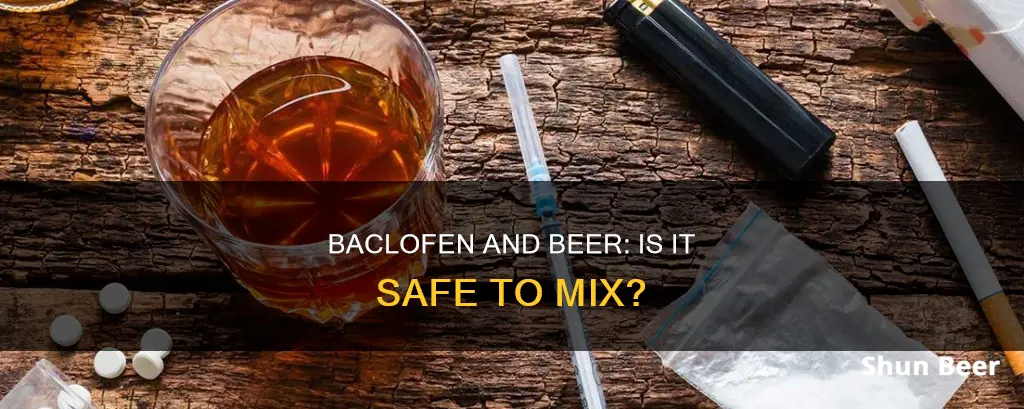
Baclofen is a prescription muscle relaxant that works by interacting with GABA receptors in the central nervous system. It is used to treat muscle spasms related to Huntington's disease, multiple sclerosis, spinal cord injuries, and spinal cord diseases. While baclofen has therapeutic benefits, there are possible risks and side effects as well. One of the biggest risks of baclofen is that it can cause withdrawal symptoms if someone suddenly stops using it. Common baclofen side effects include drowsiness and impaired balance.
Alcohol is a central nervous system depressant that can slow down brain activity and functions such as breathing and heart rate. When combined with baclofen, alcohol can increase the nervous system side effects of the drug, such as dizziness, drowsiness, and difficulty concentrating. It can also impair thinking and judgment. Therefore, it is generally recommended to avoid or limit alcohol consumption while taking baclofen.
However, baclofen is increasingly being considered as a potential treatment for alcoholism and alcohol withdrawal. While this is still considered an off-label use, there is some clinical evidence suggesting that baclofen may be effective in addiction treatment. More research is needed to fully understand the interactions between baclofen and alcohol, especially in the context of treating alcohol use disorders.
| Characteristics | Values |
|---|---|
| Should you drink beer when taking baclofen? | No |
| Is it dangerous to drink beer when taking baclofen? | Yes |
| Why is it dangerous? | Both are central nervous system depressants, so when they are used together they can heighten the effects of one another. |
| What are the side effects of mixing beer and baclofen? | Extreme drowsiness and weakness, changes in mood, agitation, confusion, and dizziness. There have been instances of people mixing alcohol and baclofen and experiencing even more severe side effects like seizures and raised blood pressure and heart rate. |
| Is there anyone who can drink beer when taking baclofen? | There is some clinical evidence that baclofen is effectively utilized in addiction treatment. However, this practice is still considered to be an off-label use for baclofen. |
What You'll Learn

The dangers of mixing alcohol and baclofen
Mixing alcohol and baclofen can have a range of negative side effects and is not recommended. Both substances are central nervous system depressants, so when taken together, they can heighten the effects of one another. This can lead to increased drowsiness or tiredness, dizziness or light-headedness, reduced motor control or coordination, and problems with memory.
Heightened side effects
The side effects of both alcohol and baclofen are more profound when the two are mixed. For example, someone who takes baclofen and drinks alcohol may experience extreme drowsiness and weakness, changes in mood, agitation, confusion, and dizziness. In some cases, mixing alcohol and baclofen can lead to even more severe side effects like seizures and raised blood pressure and heart rate.
Increased risk of overdose
Since both alcohol and baclofen are central nervous system depressants, taking them together can increase the risk of overdose. This is especially true when large amounts of baclofen are taken to achieve a high similar to that of narcotics.
Addiction risk
Both alcohol and baclofen are potentially addictive substances. Long-term use of either or both may increase the risk of developing an addiction.
Withdrawal symptoms
Baclofen can cause withdrawal symptoms if someone suddenly stops using it. Baclofen withdrawal can be severe and may include symptoms such as hallucinations, psychosis, and seizures.
Interactions with other drugs
It is important to note that baclofen may also interact with other drugs, including opioid pain relievers, benzodiazepines, tricyclic antidepressants, monoamine oxidase inhibitors, and selective serotonin reuptake inhibitors. It is always best to consult a doctor or pharmacist before mixing any medications or substances.
Beer Macros: Why They Fail and How to Fix It
You may want to see also

Side effects of mixing alcohol and baclofen
Baclofen is a prescription muscle relaxant, used primarily to treat skeletal spasticity. It is believed to be a central nervous system depressant. Both alcohol and baclofen are depressants, meaning they lower neurotransmission levels in the brain, creating a relaxed, mellow feeling.
Mixing alcohol and baclofen can heighten the effects of both substances. The side effects of both can become more profound, leading to extreme drowsiness and weakness, changes in mood, agitation, confusion, and dizziness. There have also been instances of more severe side effects such as seizures, raised blood pressure, and heart rate.
Baclofen is also known to cause withdrawal symptoms if someone suddenly stops using it. Common side effects of baclofen include drowsiness and impaired balance.
Both alcohol and baclofen are central nervous system depressants. When used simultaneously, a person is more likely to overdose. Baclofen overdose symptoms can include nausea, vomiting, severe muscle weakness, problems breathing, seizures, and coma.
Mixing Oxycodone and Beer: What's the Danger?
You may want to see also

Why you should avoid mixing alcohol and baclofen
Baclofen is a central nervous system depressant, often used as a muscle relaxant to treat conditions like spasticity. It is also believed to be effective in treating alcohol withdrawal, although this is still up for debate.
Mixing baclofen and alcohol can be incredibly dangerous. Both are central nervous system depressants, which slow down brain activity and can make you feel calm or sleepy. Since they have similar effects on the body, combining the two may compound their impact, leading to intensified side effects such as:
- Increased drowsiness or tiredness
- Dizziness or light-headedness
- Reduced motor control or coordination
- Problems with memory
- Increased risk of seizures
- Increased risk of overdose
A study published in Alcohol and Alcoholism documented the case of a 46-year-old patient who suffered two seizures after drinking alcohol while on baclofen. Other studies have found that mixing baclofen and alcohol can contribute to raised blood pressure and heart rate, which can be dangerous for individuals with pre-existing heart problems.
Therefore, it is recommended to refrain from alcohol while taking baclofen.
Lovastatin and Beer: A Safe Mix?
You may want to see also

Baclofen's potential in treating alcoholism and alcohol withdrawal
Baclofen is a GABA-B receptor agonist with an approved indication to control spasticity. It has shown potential in treating alcoholism and alcohol withdrawal syndrome (AWS).
Treating Alcoholism
Baclofen has been shown to decrease alcohol intake and self-administration in rats. Several human studies have also shown that baclofen decreases alcohol craving and intake in alcohol-dependent patients. It has also been observed to reduce anxiety in baclofen-treated alcohol-dependent patients.
Treating Alcohol Withdrawal Syndrome
Baclofen has been shown to suppress AWS in rats made physically dependent on alcohol. It has also been used successfully as an open-label treatment in humans with AWS.
Baclofen is mainly excreted through the kidney and has minimal liver metabolism. Therefore, it is considered a safer alternative to benzodiazepines, which are the first-line treatment for AWS, for patients with impaired liver function.
Limitations and Further Research
Baclofen's potential in treating alcoholism and AWS has been demonstrated primarily through open-label studies and case reports. While there have been a few randomised controlled trials (RCTs), the quality of evidence has been deemed very low. More well-designed, double-blind RCTs with larger numbers of participants are required to establish how effective and well-tolerated baclofen is in treating AWS.
Beer as Petrol: Can You Really Run on Hops?
You may want to see also

The effects of mixing alcohol with other drugs
Mixing alcohol with other drugs is extremely unsafe and can be life-threatening. When consuming more than one substance, the body must determine how to metabolize them, delaying the elimination of one of the substances, causing it to remain in your blood longer, and ultimately creating more intense and dangerous effects.
Mixing Alcohol with Over-the-Counter Medicines:
Over-the-counter medications can produce varying symptoms when mixed with alcohol, including drowsiness, restlessness, jitteriness, sweating, nausea, vomiting, confusion, paranoia, and stomach pain. Mixing the two can also increase the effects of alcohol, impair the ability to function, and cause loss of coordination and consciousness.
Mixing Alcohol with Marijuana:
Alcohol and marijuana both produce similar effects, such as initial pleasure or euphoria and sedation, and they impair cognition and motor functions. Mixing them can lead to an increased tolerance, meaning higher consumption to achieve the same effects. This can alter healthy brain development in teenagers and young adults. Combining alcohol and marijuana can also increase the risk of accidents and injuries, especially when driving.
Mixing Alcohol with Cocaine:
Cocaine is a stimulant that produces symptoms such as a rapid heartbeat and paranoia. When combined with alcohol, they create a psychoactive metabolite called cocaethylene, which leads to more intense and longer-lasting psychoactive effects and increases the chances of a cardiovascular event.
Mixing Alcohol with Opioids:
Opioids are highly addictive prescription drugs that aid in pain relief. Mixing them with alcohol is dangerous because both are central nervous system depressants. This combination can lead to a loss of motor functioning, impaired breathing and heart rate, itching, and a drastically increased potential for accidental overdose.
Mixing Alcohol with Hallucinogens:
Hallucinogens include psychedelic and dissociative drugs such as LSD, psilocybin mushrooms, ketamine, and ecstasy. Mixing these substances with alcohol can lead to intense sensory reactions, disconnection from the body, extreme emotional responses, and altered perceptions and thought patterns. Long-term misuse can result in kidney failure, heart valve disease, urinary tract issues, and hallucinogen persisting perception disorder (HPPD).
Mixing Alcohol with Amphetamines:
Amphetamines refer to illicit drugs like methamphetamine and prescription stimulants for attention deficit hyperactivity disorders. When mixed with alcohol, they can confuse the brain and lead to a rise in body temperature, kidney or liver damage, cardiac-related events, new psychiatric symptoms, and circulation problems. The combination of methamphetamine and alcohol is particularly life-threatening, putting extreme pressure on the heart and raising blood pressure.
Mixing Alcohol with Caffeine:
Consuming energy drinks with alcohol can lead to gastrointestinal problems, decreased coordination, rambling thoughts and speech, and impaired motor skills. Additionally, the false perception of intoxication may lead to drinking more alcohol than one can handle, resulting in dire consequences.
Mixing Alcohol with Antidepressants:
Alcohol and antidepressants can magnify each other's effects, leading to increased intoxication. They can also negate each other, reducing the effectiveness of the antidepressant and hindering the desired outcomes of treatment. This combination can further cause extreme emotions due to altered neurotransmitter communication in the brain.
The Chemistry of Beer: How It Works and Why It Matters
You may want to see also







